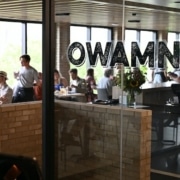OWAMNI | Presenting Owamni by the Sioux Chef
With stellar views of St Anthony Falls and the Stone Arch Bridge on the Mississippi riverfront in downtown Minneapolis, this acclaimed four-season, full-service Indigenous restaurant presents delicious Native American cuisine.
by Sharyn Jackson of Minneapolis StarTribune – August 4, 2021
Owamni opened July 19, 2021. It was long in the making — some could say centuries — for Minneapolis to get its first full-service Indigenous restaurant.
It also was a goal Sean Sherman and Dana Thompson have worked toward since they founded the catering and educational nonprofit the Sioux Chef in 2014. Last month, it arrived. Owamni by the Sioux Chef reclaims a former mill on the Mississippi River waterfront, where it overlooks the sacred Owámniyomni, the Dakota name for St. Anthony Falls and the restaurant’s namesake.
Location: Inside the Water Works Park Pavilion, 425 West River Pkwy., Mpls., owamni.com. Open for dinner 4 to 9 p.m. Tuesday and Wednesday, and for lunch and dinner 11 a.m. to 9 p.m. Thursday through Sunday.
The vibe: Built right into mill ruins along the Mississippi River, the pavilion — formerly home to Minneapolis’ first Japanese restaurant, Fuji Ya — gives off a historic aura that befits the groundbreaking restaurants that have taken residence within. Indoors, a long, narrow space maximizes views from a wall of river-facing windows. Opposite the single row of tables is an energetic open kitchen; the bar in between serves food. The smallish dining room exudes a lively, city feel. A casual outdoor terrace accommodates guests without reservations at metal tables and a few chairless high-tops.
The food: Showcasing Indigenous foods, including wild plants and game, Sherman omits colonial ingredients — foods brought here by white European settlers — such as wheat flour, cane sugar and dairy. Dishes are naturally free of gluten, soy, dairy, pork, beef, chicken and sugar, and there are substantial vegetarian and vegan options to accommodate any number of diets.
Casting aside those supermarket staples makes room for truly local ingredients that shine in bright purées of berries and fermented fruits, a creamy dandelion pesto, or the airy crunch of a cracker made from corn’s wild ancestor, teosinte. Plates are garnished with a rainbow of flowers, leaves and fruit.
Shareable appetizers are categorized by primary ingredients: Wamakhaskan (game) or Watho (plants). For larger plates, there are corn sandwiches, salads, a grain bowl and three entrees (bison, fish and vegetarian).
We tried something from each section of the menu, beginning with a creamy spread made from white beans topped with generous hunks of lightly smoked Red Cliff Lake trout ($11).
Under the Choginyapi section, we chose a sandwich of mouthwatering pulled turkey, squash slaw and cranberry sauce, held together by griddled corn patties (known as an arepa). Our favorite dish of the night spun a Thanksgiving sandwich on its head and rightfully set it back down in Indigenous context ($14).
Room for dessert? A shortlist of items are, shockingly, still dairy- and sugar-free. We went with a parfait of forest berry compote and cream made from puréed walnuts ($8). It was as if peanut butter and jelly got back to its roots — and grew up.
Drinks: You won’t find hard cocktails. Instead, look for a substantial list of iced teas and craft mocktails that utilize Indigenous plants, including wild rice, corn, sumac, nettle leaf and chaga mushrooms (teas $5, zero-proof cocktails $10). A drink list featuring wineries and breweries owned by women, Indigenous people and people of color is available both in the restaurant and at a stand on the lower-level public patio along West River Parkway.
Plan ahead: Reservations are flying, especially at prime times, but check Resy for more availability through the end of September (resy.com/ cities/msp/owamni). No reservation? The Wankata (upper patio) has first-come-first-served tables with breathtaking views.



